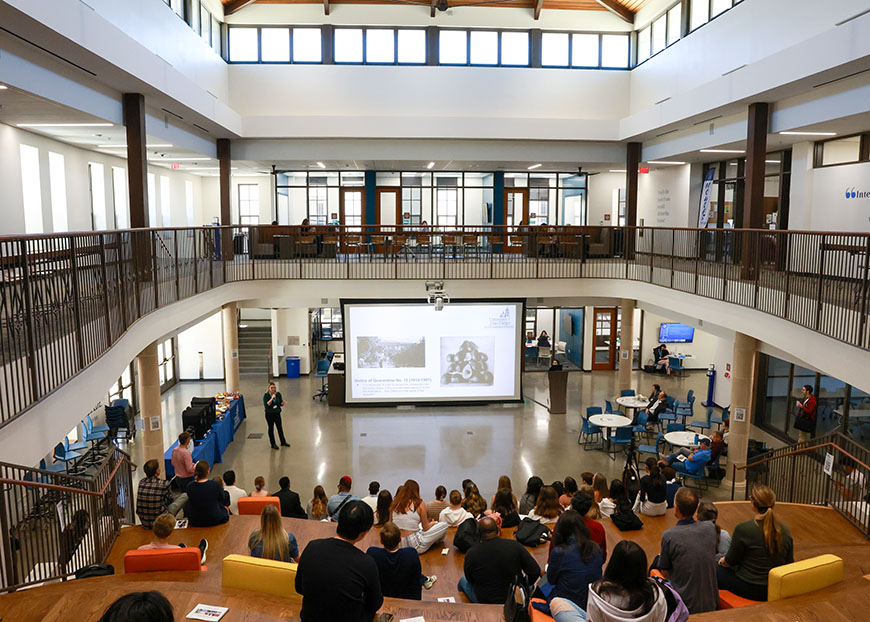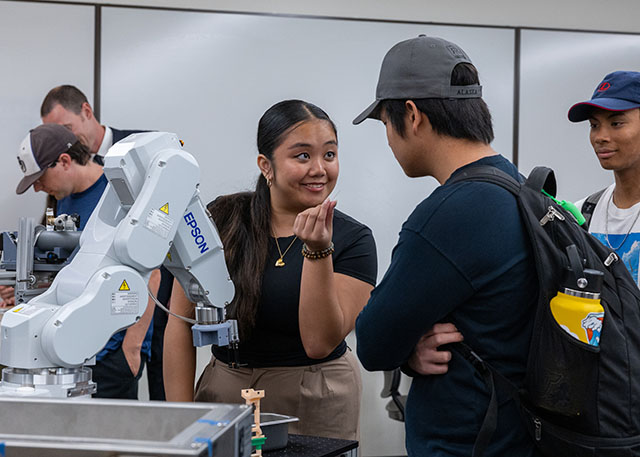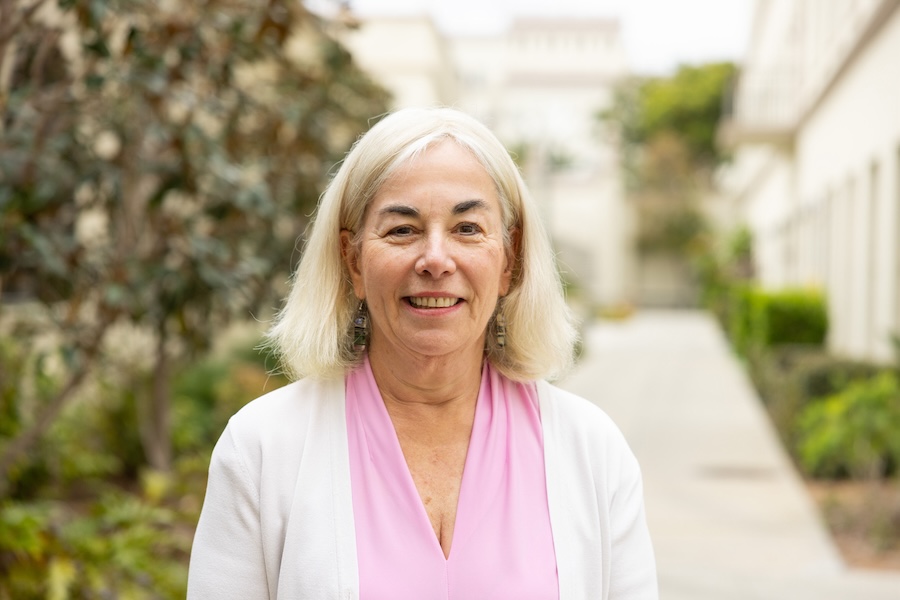‘Pecha Kucha’ Format Highlights Revamped Creative Collaborations
Undergraduate research takes center stage at annual Research Month conference
 Students and faculty listen to a presenter during the 34th Creative Collaborations inside the Learning Commons on Tuesday, April 16, 2024. (Photo by Matthew Piechalak)
Students and faculty listen to a presenter during the 34th Creative Collaborations inside the Learning Commons on Tuesday, April 16, 2024. (Photo by Matthew Piechalak) Brevity was the name of the game at USD’s 34th Creative Collaborations Undergraduate Research Conference on April 16 in the Learning Commons.
The two-day conference was divided into four sessions and student-presenters were required to utilize Pecha Kucha, a Japanese storytelling format that restricts researchers to a specific time limit to keep presentations brief. In this case, presenters were limited to six slides that automatically advanced every 20 seconds.
“This rapid format is meant to be more engaging and allows the audience to experience the breadth of topics being explored in undergraduate research,” USD Director for Undergraduate Research Timothy Clark, PhD, told the audience gathered in the town square for the opening session. “This style is meant to be fun. It’s meant to be engaging in ways that weren't possible in the poster format. It’s meant to be less formal.”
Creative Collaborations previously featured poster presentations — similar to a science fair — where students would present to anyone interested in their research. Along with brevity, the new format allowed students to showcase their research for a broad audience instead of a handful of people.
“The audience gets to see a variety of topics that they may not learn about from traditional formats,” said Clark. “The style also teaches students how to talk about their research succinctly to a broad audience — it’s a great way to help students prepare to discuss their research in job interviews and other venues.”
Facing a crowd of peers, professors and administrators gathered in the seating gallery, each presenter gave what amounted to an elevator pitch of their research that included their central research question, methods, goals and outcomes.
Biophysics major Maya Nugent really enjoyed the quick pace.
“It challenged me to discuss a very complex topic in a very short amount of time,” Nugent said. “I found the best way to prepare was to practice the whole presentation several times. Usually, I prepare the same way but learn each slide individually. I found it helpful to just practice the entire presentation all at once.”
Pecha Kucha also allowed students like Nugent to experience their peers' great work.
“I think it was really cool to have the opportunity to learn about research outside of my discipline,” she said. “If it had been set up like a poster session, I probably wouldn't have gone to many posters outside my discipline, but because of the format this year, I got to learn about all the research happening at USD.”
The new format was both fun and stressful, said Industrial and Systems Engineering major Kylie Kirkpatrick.
“Some of the projects are so data intensive,” Kirkpatrick said. “It was hard to explain my project to a room full of people [across] majors in less than two minutes. I think perhaps doing an additional minute would be beneficial. “Overall, it was an amazing event. I feel like I get so caught up in my field and industry that I never get to witness what other students outside of engineering are doing on campus.”
Creative Collaborations is one of the main events during USD’s Research Month, held each April. The conference celebrates and promotes undergraduate research at USD and gives students the opportunity to present their work in a professional setting.
“It brings attention and prestige to undergraduate research opportunities, helping students to recognize the value of undergraduate research for achieving their educational and professional goals,” Clark said. “As a university, we have really been recognizing the value of research as a transformative experience for our students.”
Following each session, the audience was asked to vote on their favorite presentations. The following students were chosen as winners for their field of study: Paine Harris (Engineering), Isabella Ramirez (Psychology), Jayne Brandt (Psychology), Ava Boughey (Engineering), Jaziel Mayoral (Art, Art History, Architecture).
— Story and photos by Matthew Piechalak; video by Alé Delgado




